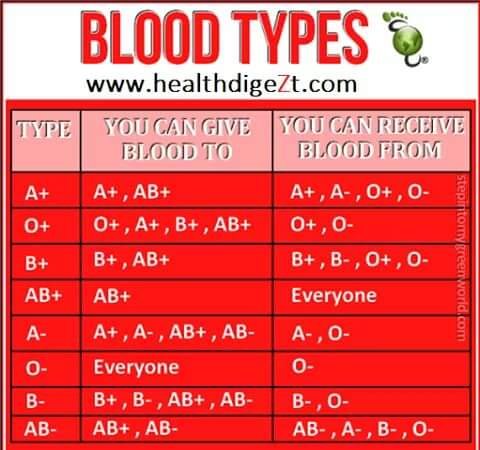HEALTH ISSUES "RHESUS (Rh)"
"RHESUS (Rh) FACTOR ON MY MIND"
A baby receives one gene from the father and one from the mother.
More specifically, consider the following:
Every person has a blood type, (O, A, B, or AB) and an Rh factor, either positive or negative. The blood type and the Rh factor simply mean that a person's blood has certain specific characteristics. The blood type is found as proteins on red blood cells and in body fluids. The Rh factor is a protein that is found on the covering of the red blood cells. If the Rh factor protein is present on the cells, the person is Rh-positive (A+, B+, AB+ and O+). If there is no Rh factor protein, the person is Rh- negative (A-, B-, AB- and O).
Rh factors are genetically determined. A baby may have the blood type and Rh factor of either parent, or a combination of both parents. The Rh-positive gene is dominant (stronger) and even when paired with an Rh-negative gene, the positive gene takes over.
•If a person has the genes + +, the Rh factor in the blood will be positive.
•If a person has the genes + -, the Rh factor will also be positive.
•If a person has the genes - -, the Rh factor will be negative.
The blood type and Rh factor of a pregnant woman and the father of her baby can affect what blood type the baby has. It will also influence the antibodies the mother's body makes as an immune response to foreign matter in her body such as bacteria, sperm and even an embryo.

Problems with the Rh factor occur when the mother's Rh factor is negative and the baby's is positive. When an Rh negative woman (5-10 per cent of women) has a baby with Rh positive blood this is called Rh incompatibility. The mother's body will treat the Rh proteins found in her baby's blood as foreign and make antibodies to attack them, as soon as the two blood types mix in any way, which is a condition called Rhesus disease.
Because a baby's blood group is usually unknown during pregnancy, all women who are Rhesus negative receive anti-D injections during pregnancy to prevent an onset of Rhesus disease at 28 and 34 weeks. Cord blood is collected at birth to check the baby's blood group, and if baby is Rhesus positive, another injection is given. These injections are very effective at stopping Rh antibodies developing and making it possible for women to be pregnant again without Rh incompatibility complications. If the baby is Rhesus negative, injections are not required.
There is no risk of rhesus isoimunization if both couples are Rhesus +ve, or are Rhesus –ve, or if a Rh –ve man marries a Rh +ve woman.
Courtesy of: STANFORD CHILDREN’S HEALTH;
BROOKE TASOVAC